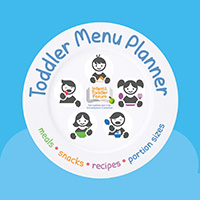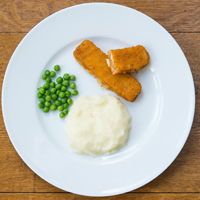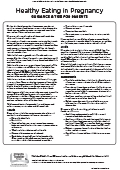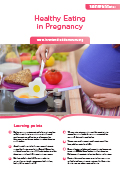
Use our Toddler Meal planning tool to ensure your 1-4 years old receives a balanced diet every day.
Find out more >
Use our toddler food tracker to check that your 1-4 year olds are getting a good balance of foods and activity
Find out more >
This educational programme for frontline professionals contains a range of practical resources on infant feeding.
Find out more >
Guidance & Tips for Pregnancy
During the first six months of pregnancy you do not need to eat extra food but you may need to change the foods you are eating to make sure you and your baby are getting all the nutrients you need.
Have a regular meal routine of three meals each day with one or two planned snacks.

STARCHY FOODS
Base each meal and some snacks on starchy foods such as bread, rice, potatoes, pasta, cous cous, breakfast cereals and low sugar and fat snack foods based on flour such as scones, buns and teabread. Using wholegrain varieties will increase fibre intake if you have a tendency towards constipation.

FRUIT AND VEGETABLES
Include fruit and vegetables at all meals and some snacks. Aim for at least five servings per day but more if possible. You can use fresh, frozen, tinned and dried fruit and vegetables.

MILK, CHEESE AND YOGURT
Include milk, cheese or yogurt three times per day. This is to ensure adequate calcium and particularly iodine which is important for your baby’s brain development. One serving is 200-250ml milk/yogurt or about 40g cheese. Note: non-dairy milks such as soy milk, nut milks and oat milks contain virtually no iodine.

OMEGA 3 FATS
Include some oily fish once or twice per week to provide omega 3 fats which are important for your baby’s development and vision. Other ways to increase omega 3 fats are to use rapeseed oil for cooking, eat walnuts and use walnut or olive oil in dressings.

SNACKS
Swap crisps and similar packet snacks, chocolate and confectionery for more nutritious snacks such as:
- Nuts with dried fruit
- Fresh fruit
- Vegetable sticks e.g. carrot, cucumber, pepper, baby corn and dips based on yogurt, cream cheese or hummus
- Wholegrain breakfast cereals with milk
- Cheese with crackers or crispbread
- Sandwiches, bread rolls and pitta breads with fillings such as fish pâté, egg, nut butters, cold meat along with salad or roasted vegetables
- Toast with a range of spreads
- Cheese on toast
- Yogurt or fromage frais
- Crumpets, scones, currant buns, teacakes, scotch pancakes
If you are having a small slice of cake or some biscuits choose those that contain dried fruit, nuts or vegetables, e.g. fruit cake, carrot cake or date and walnut loaf.
Fluids
Have about six to eight drinks per day (1.5 -2 litres) to provide adequate fluid to prevent dehydration. More drinks may be needed in hot weather and after physical activity. Limit caffeine intake in drinks and food to less than 200mg/day, e.g. four small cups of tea or two mugs of instant coffee.
Alcohol: it is safest not to drink at all during pregnancy and especially in the first trimester. If you do choose to drink alcohol in the second and third trimesters limit it to a maximum of one or two units of alcohol once or twice per week.
Supplements
- Take folic acid before and during the first trimester of your pregnancy and take vitamin D throughout pregnancy
- If you do not have three servings of milk, cheese or yogurt each day and/or do not eat fish then choose a supplement suitable for pregnancy that contains iodine and omega 3 fats
- Avoid any supplements containing retinol or fish oil supplements containing vitamin A
- Only buy supplements from a reliable company with good quality control i.e. brands on sale in pharmacies
Be sure to follow food safety guidelines to avoid foodborne illnesses
- Avoid liver, undercooked meat/fish/eggs and unpasteurised dairy products
- Avoid swordfish, marlin and shark and limit tuna to four medium-sized cans per week (with a drained weight of about 140g per can) or fresh tuna steaks (weighing about 140g when cooked or 170g raw)
- Reheat any convenience food to piping hot before eating – only heat once • Carefully wash vegetables and fruit to remove any soil




